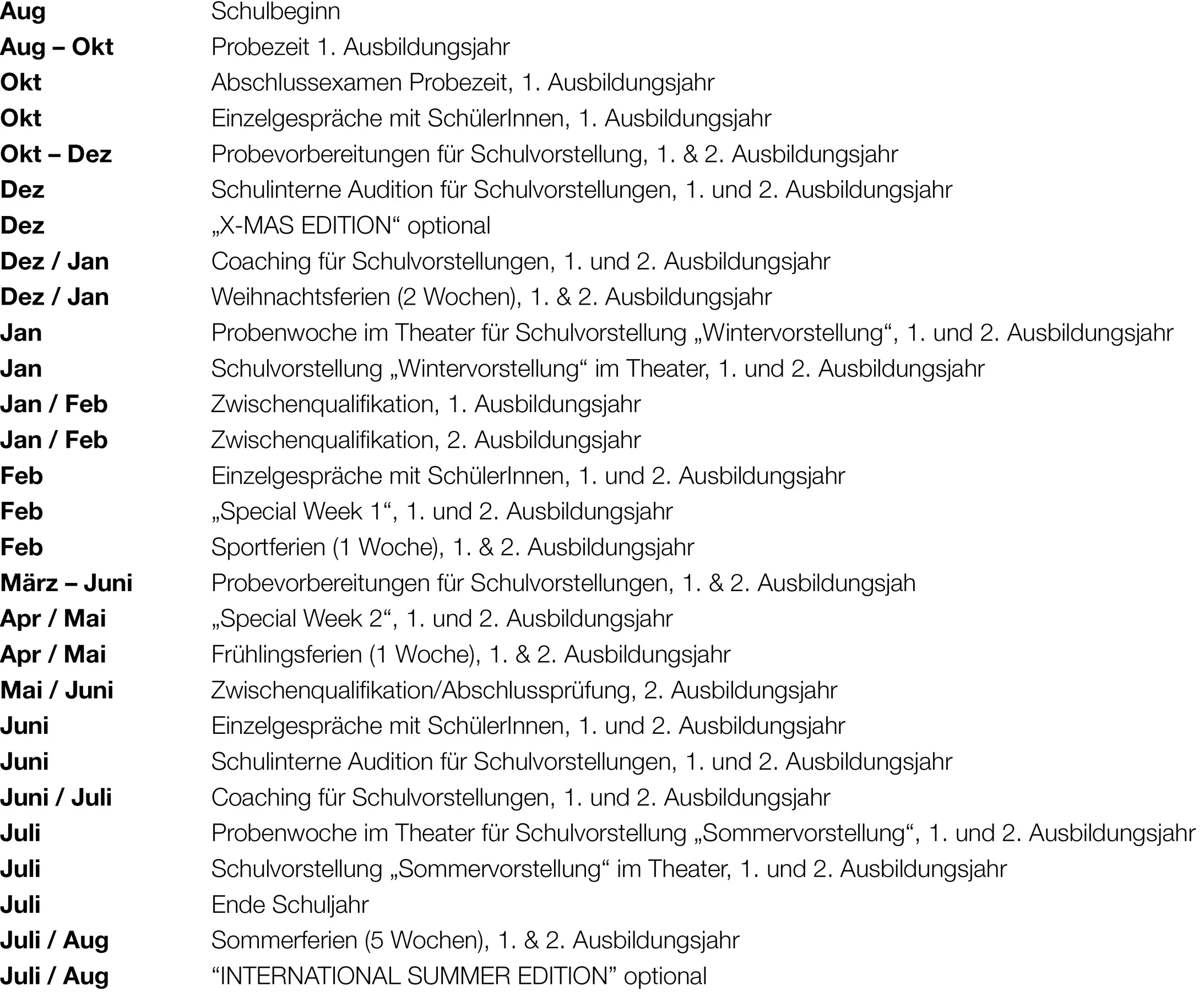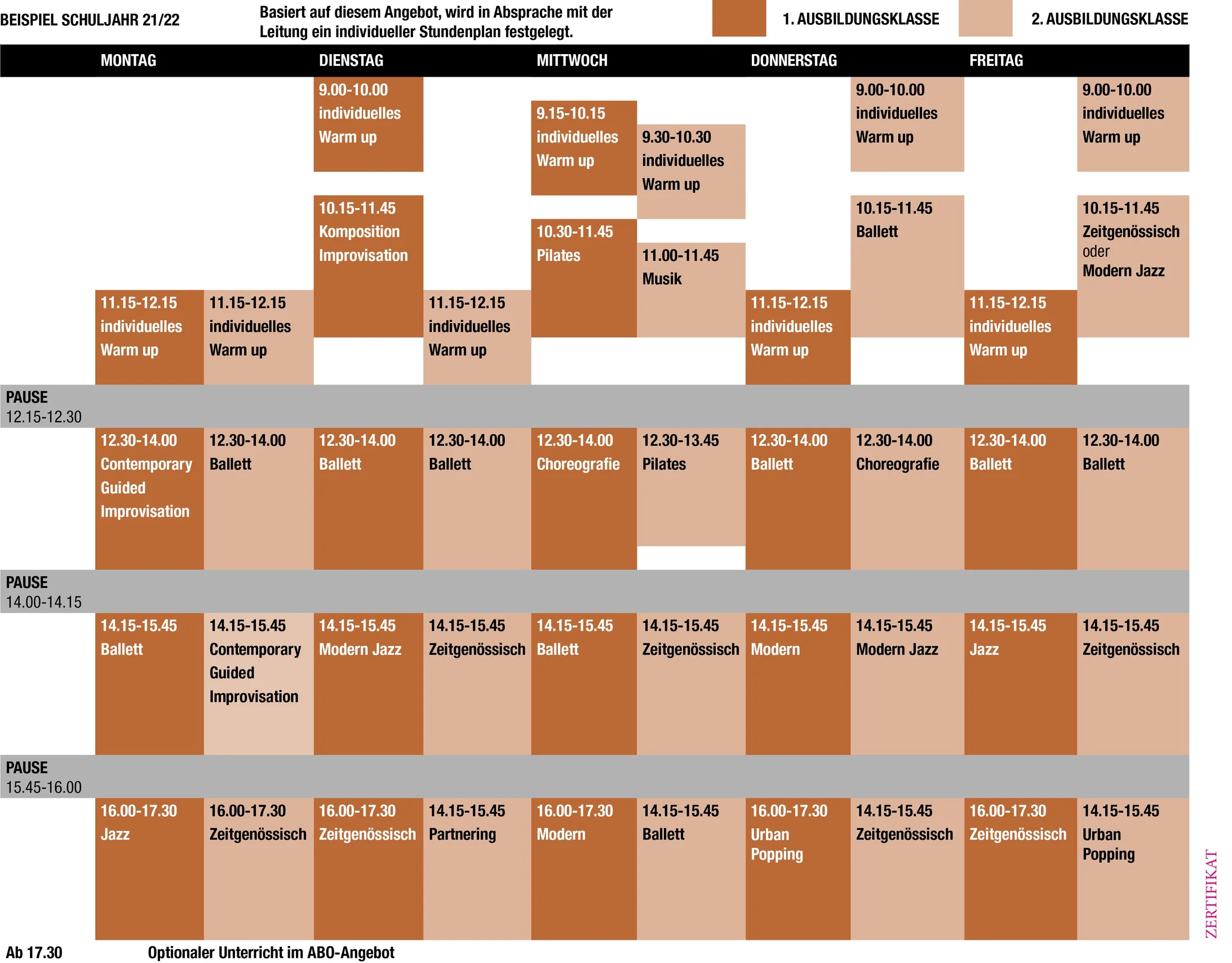Training course GAB KV
Duration
The dance training at the basic stage dance certificate course (GAB) in conjunction with the commercial training (KV) at the Sport Academy Zurich (SAZ) with the Swiss Federal Commercial Diploma (EFZ) takes 4 years. Training begins in August.
Course of Training

Schedule

Subjects
The range of subjects available to students on the basic stage dance course at the school with parallel KV training extends from classical and modern dance techniques to contemporary and urban dance forms. Dance-related bodywork is also taught, which supports the development of the dancer's deep awareness. Creativity is also encouraged with subjects such as choreography, composition and improvisation. The theoretical subjects, projects and modules expand the range of courses on offer and open up access to other art forms as well as to future professional activities on and around the stage.
The following list of subjects on the diploma course is intended to give those interested in basic stage dance training an overview of the choice of subjects and specializations.
Practical subjects
- Classical Ballett
- Modern Dance
- Contemporary
- Jazz Dance
- Modern Jazz
- Contemporary Jazz
- Urban Styles (Hip-Hop, Old School, New School, Popping)
- Partnering
- Contemporary Guided Improvisation
- Improvisation
- Contact Improvisation
- Choreography
- Composition
- Pilates
Theoretical Subjects
- Dance History
- Music
- Dance Medicine
Special Week
- Rehearsal weeks with guest choregraphers
- Project weeks with various topics and subjects
Extracurricular modules / projects
- Occupational knowledge
- Self management: Strength and Flexibility
- Developing class choreographies with individual teachers for school performances
- Developing own choreographies for school performances
- Watching dance pieces on DVD with debriefing and written work
- Joint visits to: Performances, exhibitions, rehearsals, cinema, artists' studios, lectures and symposia with debriefings and final written work
- Talk to the professional: Lecture, discussion and exchange with professional dancers, choreographers and theater makers
- Tasks: Writing reports and papers
- Self-study with assignments
Coaching
- Watch and analyze movement material filmed in class
- Dance sequences in the studio individually in front of the class and analyze them in the group
- Cover and deepen various topics relating to movement quality and technique
- Individual coaching with individual teachers on the choreographies developed by the students themselves, in preparation for the school performances
Individual support for each students
- E.g. for participation in competitions
Exams
Intermediate qualifications
Each school year, two intermediate qualifications (in winter and summer) take place in the certificate course (parallel to the KV training at the SAZ), in which the resources and skills acquired in the subjects taken are tested and assessed in accordance with the curriculum. The intermediate qualifications are carried out by an examination board made up of the subject teachers, the school management and an external examination expert. The professional and individual personal development in the current semester is assessed with regard to the status at the beginning of the course. The intermediate qualification also includes the school performances on a public stage, which take place every semester.
Trial period and final examination
The first seven weeks of the first school year are considered a trial period and are concluded with a final exam. The main subjects tested are ballet, modern, jazz and urban.
Certificate examination and certificate thesis
The final qualification consists of an internal and an external part. In the internal part, a certificate examination is taken, which tests the resources and skills in the subjects taken. The external part, the certificate thesis, is carried out as part of a presentation with a public character. The certificate thesis is made up of the chosen subjects.
Talks
The examination interviews form the conclusion of the respective qualifications. These are individual discussions with the students, which take place with selected subject teachers and the school management. Here, the student receives individual feedback on their performance in the previous semester.
Graduation
After completing the training, graduates receive a certificate. At the same time, the EFZ commercial qualification is acquired at the SAZ.
Performances
The students conclude each semester with a public performance in a professional theater. The successful completion of these performances is an integral part of the training and part of the certificate.
The program of the performance consists on the one hand of choreographies by guest choreographers and class pieces created by teachers in the areas of contemporary, jazz and urban. The other part of the performance consists of individual students' own choreographies. In the run-up to the school performances, those interested gather their themes and ideas independently and create solos, duets, trios and even group pieces. The pieces are evaluated by a jury at an internal audition and, if necessary, selected for the performance.
The preparation phase in the studio, the rehearsals in the theater and the actual performance is an important working and learning process for the students, whether in the role of choreographer or dancer. The students learn how a dance piece is created, how to behave in rehearsals and on stage and how to deal with success and criticism. They also learn the basic rules of theater and gain their first experience in lighting and costume design.
Work steps and processes using the example of semester 1
- Choreography (Pieces by invited choreographers, subject teachers or fellow students)
- Studio rehearsals
- Stage rehearsals
- Main rehearsal, dress rehearsal and performance from the first contact with the stage to bowing during the applause.
Learning objectives and resources provided
- Execute on instruction
- Instruct
- Team work
- Dealing with audiences and criticism
- Mental preparation and stress management
- Memorizing movement sequences
- To mark
- Dealing with management assessment
- Communication on sound with sound, light, director, choreographers, colleagues
Tuition
The costs for dance training at the basic stage dance course are between CHF 970.- and CHF 1'150.- per month.
The average monthly tuition fee for a commercial apprenticeship at the SAZ is CHF 1125.-.
Network
In addition to artistic and technical skills, the dance network is one of the most important components when it comes to being successful in the dance world.
The school's network includes:
- Students/fellow students
- Teachers
- Companies, that rehearse on site
- Guest teachers
- External dance experts
- Guest choreographers
- Former teachers

